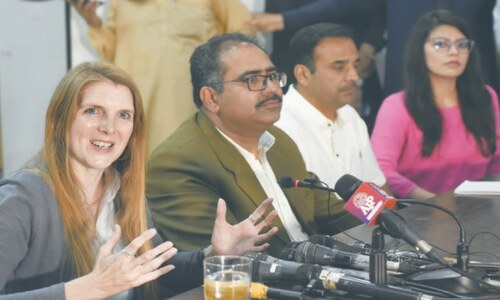ISLAMABAD: Pakistan’s first ever conference on women’s menstrual health and hygiene was held on Monday, during which speakers highlighted the need to discuss menstrual hygiene and maternal and reproductive health and called on political parties to include women’s health and hygiene as a right in their manifestos.
Speakers also said that Pakistan has largely been a society closed to health issues specific to women, and talking about menstrual hygiene is a major taboo even in moderate and educated circles.
The conference, titled HackThePad: Women Health and Hygiene Conference, was hosted by iCube, Peace University, the Sustainable Development Policy Institute (SDPI), Motorway Police, and the Young Parliamentarians Forum (YPF) at the Pakistan Institute of Parliamentarian Services (Pips).
Speakers discussed issues related to gender equality, the rights and wellbeing of women and girls and the way forward to counter entrenched gender disparity.
Dr Saeeda Batool, the head of the Pakistan Institute of Medical Sciences’ (Pims) gynaecology department, emphasised the need to understand that reproductive and sexual rights are women’s rights.
“Primary healthcare systems that provide reproductive health facilities to rural women are non-functional even in Islamabad’s suburban areas. We can image what the situation would be in the rest of Pakistan,” she said.
Dr Batool said early marriages, a lack of family planning and maternal and reproductive health facilities were the reasons why Pakistan is one the countries with high maternity mortality and neonatal death rates.
Climate Change Parliamentary Secretary Romina Khursheed Alam, a member of the YPF, said this was the right time, before the elections, to talk about these issues and break social taboos.
SDPI Executive Director Dr Abid Qayyum Suleri suggested that political parties include women’s health and hygiene as an election promise in their manifestos.
“We cannot achieve health-related Sustainable Development Goals (SDGs) unless we empower our women through giving their due rights of education, health and giving them their due participation in the decision making process,” he added.
Peace University Director Ziad Khan said on the occasion that it was unfortunate that issues related to women’s health and hygiene are not discussed or addressed as they should be. He said around 97pc of women are victims of malnutrition in Pakistan, calling the situation a shame and a disgrace.
Inspector General of Railways Police Dr Mujeebur Rehman said attitudes and actions towards women should be changed to ensure they are provided an enabling working environment and can harness their true potential.
Published in Dawn, May 15th, 2018














































Dear visitor, the comments section is undergoing an overhaul and will return soon.